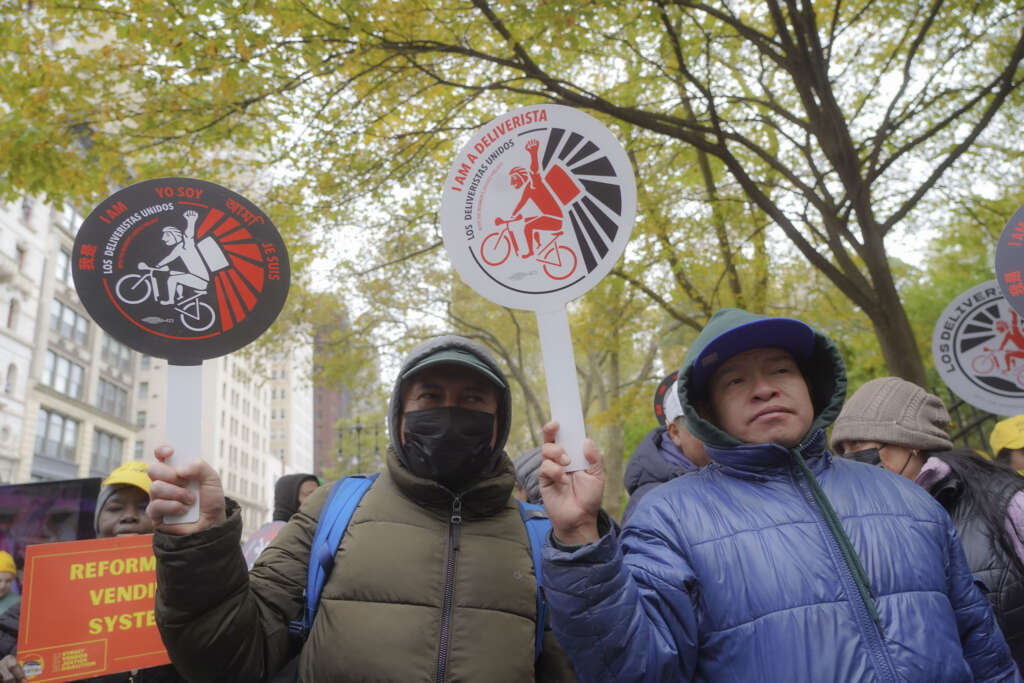Copyright citylimits

A week after federal agents arrested sellers on Canal Street during an immigration sweep, street vendors teamed up with delivery workers to push for better conditions and more protections in their immigrant-heavy industries. A week after federal agents arrested sellers on Canal Street during an immigration sweep, street vendors teamed up with delivery workers to push for better conditions and more protections in their immigrant-heavy industries during a rally Wednesday morning. While the protections that each group is requesting won’t completely shield them from U.S. Immigration and Customs Enforcement’s (ICE) arrests, advocates for both groups say city policies—enforced by the NYPD, through the issuance of criminal tickets—have placed delivery workers and street vendors on the immigration enforcement radar. After ICE Director Todd Lyons said “more arrests” will come to the city, these workers are bracing for what’s to come. “The moment is now,” said Mohamed Attia, managing director of the Street Vendor Project, during a rally outside City Hall Wednesday. “Because it is our deliveristas and street vendors who are under attack like never before.” During Wednesday’s rally, advocates and workers in these industries asked the City Council, in its few remaining sessions this year, to pass a series of bills, including legislation that would prohibit app-based delivery services from deactivating workers without cause. With deactivation, a worker’s account is permanently terminated. But beyond major policy violations, delivery workers and advocates say there’s no clear definition of what triggers a deactivation, which means losing the ability to work for the app. “Please pass those bills,” said Cellou Balde, a delivery worker with the group Los Deliveristas during the rally. “People in New York are often complaining about delivery workers. We are traveling fast. We understand the concern, but often we have no choice. We must take the risk to deliver quick, often on an impossible time frame, to avoid losing our job that we have. Deactivation is a huge problem for our community, because this work is how we survive.” Instacart didn’t respond to City Limits’ request for comment on the bill and its deactivation policies. Grubhub says it’s been working with Los Deliveristas Unidos and the City Council to make its process transparent. The company criticized the Council’s bill, saying it would take away its ability to act quickly to enforce their standards, which is essential for public safety. “As written, Intro 1332 would require platforms to keep drivers active despite serious safety or service issues and could expose sensitive customer information—putting diners, restaurant workers, and other drivers at risk,” a Grubhub spokesperson said in a statement. Kassandra Perez-Desir, DoorDash’s head of government relations in New York, cited similar safety concerns. “We agree that deactivations should be rare and handled fairly, but this model is a recipe for harm for everyone who depends on a safe platform. The Council should look to proven models that better balance fairness with accountability.”* Uber said that it supports the main idea of the new law, but not its details as drafted. “The bill must focus on workers who have permanently lost access to delivery apps,” an Uber spokesperson said in a statement, a reference to another practice of “lockouts,” which blocks workers from using the apps at certain times. The Council bill would also address lockouts, using a broad definition of “deactivation” as a permanent or temporary restriction to access the app. “Since delivery workers are paid for all of their time on the app—not just when a delivery is made—app companies must control costs by limiting the number of people who can work simultaneously, just like every other business. Otherwise, thousands of workers could be online and being paid when there is little or no delivery activity, which would significantly increase consumer costs,” an Uber spokesperson said in a statement. Another set of bills would reform street vending in the city by expanding licenses, eventually lifting a long-held cap on that number, which workers say has made it hard for them to operate legally (though the Council recently passed legislation—overriding a mayoral veto—that decriminalized vending without a license, something sellers had long called for). The bills would also create a vendor division within the Department of Small Business Services, make more applications available so that the maximum 445 supervisory licenses are issued every year, and allow vending farther from the curb. The push comes after the Adams administration ramped up enforcement in the delivery and vending sectors. During the spring, the NYPD quietly stopped giving civil traffic tickets to cyclists—now issuing criminal tickets instead. In addition, on Oct 24, New York City implemented a 15 mile per hour speed limit for e-bikes, e-scooters, and pedal-assist commercial bicycles. When the changes were announced, Mayor Eric Adams said the city would take an education-first approach, and enforcement second, issuing warnings to first-time offenders. “To be clear, this isn’t about criminalization; it’s about creating safer, fairer conditions for all New Yorkers,” Adams said. While the NYPD is giving warnings at the moment, they haven’t said exactly when police will start handing out criminal tickets when asked by City Limits. Advocates and deliveristas, however, criticized the new speed limit because it would bring more enforcement to the industry, mainly made up of immigrant delivery workers who are already fearful under the Trump administration’s crackdown. They also cast blame on the app companies, saying workers are pressured to make deliveries as quickly as possible. “[Intro] 1332 is about ensuring deliveristas, 80,000 delivery workers in the city, have just cause protections, making sure that the apps…do not fire and punish deliveristas because they want to drive safe, because they want to prioritize their safety, and because they choose to stay at home in case of an ICE raid,” said Ligia Guallpa, executive director of Workers Justice Project—the non-profit organization that backs Los Deliveristas Unidos—during the rally. Gabriel Montero, the director of development and communications at the Workers’ Justice Project, said that app companies have deactivated hundreds of workers’ accounts in a month, leaving them on edge and afraid of losing their jobs. Councilmember Christopher Marte, who represents the Chinatown area where the recent immigration raid took place, called out fellow council members who have yet to support the bills. “In the City Council right now are hypocrites,” Marte said. “They’re really quick to provide a quote, but they still haven’t signed on to these bills that’s been out there for months. When a delivery worker gets hit, gets injured, sometimes, unfortunately, dies, we’re quick to write a statement. We’re quick to have a rally. Well, we’re not quick to have a hearing and a vote that’s actually going to protect our workers.” Julia Agos, a spokesperson for the City Council, said in a statement that “the additional street vending bills continue to go through the legislative process that is deliberative and allows for thorough public input.” ‘No attorneys taking new cases’ Both groups are especially at risk of being targeted by ICE during raids since they work on the street. But when these workers are arrested, along with other immigrants in the city, it’s hard to find—or afford—a lawyer who can represent them and fight their case while they’re in detention. This year, New York City allocated more funds for immigration legal services in its most recent budget passed in June, from $65 million to $120 million in response to the Trump administration’s crackdown. However, several months after the start of the new fiscal year in July, immigration advocates reported that despite the infusion of funds, it remains very difficult to find full representation from a lawyer. Some legal providers, like The Bronx Defenders and Brooklyn Defender Services, said that funding shouldn’t be determined in one-year increments, emphasizing the need for sustained support as many immigration cases take years to resolve. “Despite these investments, the need continues to grow and evolve at the Bronx Defenders, we regularly receive calls from people seeking representation for ICE check-ins, naturalization and other applications for status, non-detained cases, post-conviction, relief or federal representation,” said Rosa Cohen-Cruz, director of immigration policy at the Bronx Defenders, testified at a City Council Immigration Committee hearing earlier this week. Officials from the Mayor’s Office of Immigrant Affairs explained that some of the gaps in legal representation also come into account when a detainee is transferred outside the state—a common practice pursued by the Trump administration. Grassroots organizations that serve immigrant New Yorkers say they’re also overwhelmed by requests for food and guidance. But these organizations do not have the resources to offer legal representation to all of those who seek it. “Right now, New York City is failing our immigrant communities when it comes to access to legal services. There are no attorneys taking new cases. The system is completely overwhelmed,” said Adama Bah. CEO and founder of Afrikana. “Black migrants are being left behind in a system that was never built for them,” Bah added. “They’re being criminalized for seeking safety, and until the city invests in real, accessible, and culturally competent legal services for our communities, this crisis will continue.” *This story was updated after publication to include comment from DoorDash. To reach the reporter behind this story, contact [email protected]. To reach the editor, contact [email protected] Want to republish this story? Find City Limits’ reprint policy here.



